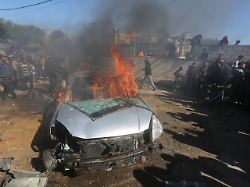“We will take care of them too”
Netanyahu threatens Hamas terrorists in Rafah
February 4, 2024, 5:55 p.m
Listen to article
This audio version was artificially generated. More info | Send feedback
The Lebanese Hezbollah and Israel’s army are engaged in fierce fighting in the border region. Meanwhile, Prime Minister Netanyahu is threatening the Hamas terrorists in Rafah. The city on the border with Egypt is already under attack. Apparently the Israeli army is about to conduct a ground operation there.
Around four months after the outbreak of the Gaza war, the fighting between Israeli soldiers and the Palestinian militia Hamas continues in the two largest cities in the Gaza Strip. Fighting continued in both Gaza City in the north and Khan Yunis in the south. This shows that Hamas continues to have a certain degree of control in the area even weeks after Israel captured the cities.
According to Israeli Prime Minister Benjamin Netanyahu, 17 of the radical Islamic militia’s 24 combat battalions have now been eliminated. The rest are mostly in the southern Gaza Strip – including Rafah on the Egyptian border. “We will take care of them too,” Netanyahu announced, according to a statement from his office. Rafah is a gathering place for hundreds of thousands of Palestinian civilians who have fled their homes in the Gaza Strip and sought refuge in the border town.
The Israeli army fired on Rafah on Saturday. A journalist from the AFP news agency heard heavy air strikes there shortly after midnight. Eyewitnesses said 12 people were killed in an airstrike on a family’s home.
Rafah is apparently to be evacuated
The authorities under the control of the terrorist organization Hamas spoke of 14 deaths in Rafah, but this statement cannot be independently verified. There were further victims in Israeli attacks on the city of Deir Al-Balah. The Israeli military did not comment on whether it had carried out airstrikes. It simply stated that, unlike Hamas’ attacks on Israeli men, women and children, the Israeli military abides by international law and strives to prevent civilian suffering.
An Israeli insider told Reuters that the military would coordinate with Egypt and look for ways to get most of the refugees north to safety before any ground operation in Rafah. Palestinians reported Israeli tank fire and airstrikes this Sunday, killing two girls in a house.
Hamas, which has ruled Gaza since 2007 and is supported by Iran, launched a major attack on Israel on October 7th. Hamas fighters entered Israeli cities and kibbutzim, and rockets fell in Israel. According to Israeli figures, 1,200 people were killed. In addition, 253 people were kidnapped to the Gaza Strip, of which more than 130 are still held hostage. Their possible release by Hamas is one of the issues being discussed in negotiations brokered by Egypt and Qatar and supported by the US to secure a ceasefire. Egypt’s President Abdel Fattah al-Sisi received French Foreign Minister Stephane Sejourne for a meeting where Egypt emphasized joint efforts to reach a ceasefire and provide humanitarian aid to Gaza.
Hezbollah fires rockets into northern Israel
Meanwhile, the Shiite militia Hezbollah and the Israeli armed forces fought again in the Israeli-Lebanese border area. According to the Israeli military, Hezbollah fired several rockets into northern Israel. The projectiles were either intercepted by Israeli missile defense or fell over uninhabited areas. In response to the attack, Israeli fighter jets bombed a Hezbollah missile site and observation posts in the southern Lebanese towns of Blida and Mais al-Jabal, the army said.
An Israeli tank also attacked a Hezbollah squad near Blida. Hezbollah announced in Beirut that it had launched three attacks across the border this Sunday. Israeli positions and the northern Israeli town of Manara were attacked. The Shiite militia also said it had lost two of its fighters in battles with the Israeli military. Since the beginning of the Gaza war after the Hamas massacre in Israel on October 7th, there have been repeated confrontations between Israel’s army and militant groups such as Hezbollah in the Israeli-Lebanese border region. It is the worst escalation since the second Lebanon war in 2006.
